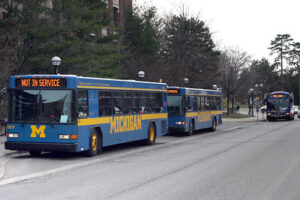Earlier this week, Governor Gretchen Whitmer announced a $1.4B proposal to improve access to affordable childcare. The funding for the proposal will come from the federal government. By lowering childcare expenses for working parents, the proposal will improve economic growth and facilitate the state’s return-to-work plan. It appears the Governor believes that investing in people will produce a superior return-on-investment.
Michigan parents need low-cost, high-quality childcare. Full-time infant childcare can cost more than full-time university tuition. For parents with more than one child, it is often cheaper for one parent to stay at home. That can destabilize a family’s finances and make it more difficult to get ahead. On a broader scale, it takes one worker out of the workforce for several consecutive years. Re-entry for that parent can be difficult, especially if that person requires retraining, or no longer has marketable skills.
Layer on the lower annual incomes that women typically make along with the loss of Social Security tax contributions, and the impact of leaving the workforce for 5-10 years to raise children can last for decades.
Investing in people, however, can make all the difference in the world. By providing childcare that costs less than university tuition, the State can help working families get ahead.
So, it is confusing when the State of Michigan announces plans to throw $1.4B in the mix to lower childcare costs just as the WCC administration shutters one of the most affordable childcare options in Washtenaw County. Measured against the yardstick of investing in people, the rationale for the closure falls rather short.
The WCC Master Plan isn’t investing in people
The stated rationale is to move the WTMC drop-off to the back of campus. WCC could have done that without closing the Children’s Center. In fact, plenty of WTMC parents drop their children off in other locations right now.
When you ask yourself, “Who is the beneficiary of this move?”, it’s not the WTMC students or their parents. And it isn’t the WCC community members who just lost on-site childcare. The move is an investment in a strategy to monetize WCC’s real estate holdings. In other words, the WCC Administration is NOT investing in people. They’re attempting to monetize real estate. The last time the Trustees signed off on something like this, they committed WCC to diverting millions of dollars from the General Fund to subsidize a flailing health club.
This strategy will NOT bring more people into the workforce. It will NOT bring more students into classrooms. In fact, it will simply make it harder for them to get onto the campus. Once they’re on campus, finding a parking space will be an exceptional challenge.
I was a student on campus when parking at WCC was a nightmare. This administration’s Master Plan will resurrect that nightmare. It will undo 20 years of trying to correct the campus’s parking capacity issues. There are few disincentives to enrolling at WCC larger than not being able to find a parking space. Why should students enroll when they will have to spend 20 minutes looking for a parking space?
Let’s not reduce campus parking capacity again
Why bring a stream of people who have no business at WCC to campus while making WCC students compete with them for campus access and parking? At the same time, WCC students, faculty and staff cannot find affordable daycare. This plan simply makes WCC unattractive as a higher education option for students. It runs counter to strategies designed to bring people back to the workforce, and it directly harms student parents.
Closing off the front of the College is not investing in people or the community. It will not make access to affordable childcare easier. It will not encourage students to enroll, or experienced faculty to stay. Under these circumstances, pursuing strategies to generate additional revenue at the expense of investing in people is at best, counterproductive. At worst, it eliminates opportunities to succeed.
Perhaps that is the best yardstick to use when evaluating strategies from this administration.
Who benefits from this investment of public funds and resources?
Are we directly investing in people?
If the beneficiary of a move is unclear, or if it does not represent a direct investment in people, it should be rejected.
Of course, that would require the WCC Trustees to provide actual oversight.
Photo Credit: Rex Roof , via Flickr

























